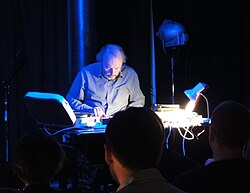Philip Jeck
Philip Jeck | |
|---|---|
 Philip Jeck headlining at Jonny Mugwump’s Exotic Pylon at the Vortex on 16 September 2011 | |
| Background information | |
| Born | 1952 (age 68–69) |
| Origin | England |
| Genres | |
| Occupation(s) |
|
| Instruments |
|
| Years active | 1980s–present |
| Labels |
|
| Website | http://www.philipjeck.com |
Philip Jeck (born 1952)[5] is an English composer and multimedia artist whose work is best known for utilising antique turntables and vinyl records, along with looping devices and both analogue and digital effects.[2] Initially composing for installations and dance companies, since 1995 he has released music on the UK label Touch.[2] He has collaborated with artists such as Gavin Bryars, Jah Wobble, Jaki Liebezeit, David Sylvian, and Janek Schaefer.[2]
Biography[]
Philip Jeck studied Visual Arts at Dartington College of Arts, Devon, England.[2] He became interested in record players after visiting New York in 1979 and being introduced to the work of DJs such as Walter Gibbons and Larry Levan.[6] He began exploring composition using record players and electronics in the early 1980s.[2] In his early career, he composed and performed scores for dance and theatre companies, including a five-year collaboration with Laurie Booth.[2] He has also composed scores for dance films Beyond Zero on Channel 4 and Pace on BBC 2.
Jeck is perhaps best known for his 1993 work Vinyl Requiem with Lol Sargent, a performance for 180 Dansette record players, 12 slide-projectors and 2 movie-projectors which won the Time Out Performance Award in 1993.[2] He signed to Touch in 1995, and has released his best known works on the label, including Surf (1998), Stoke (2002), and 7 (2003).[2] In 2004, he collaborated with Alter Ego on a 2005 rendition of composer Gavin Bryars's The Sinking of the Titanic.[2] His 2008 album Sand was named the 2nd best album of that year by The Wire.[7] Much of his studio releases are pieced together from recordings of his own live performances and stitched together with a MiniDisc recorder.[2]
Discography[]
Studio and live recordings[]
- Loopholes (1995, Touch)
- Surf (1998, Touch)
- Live in Tokyo (2000, Touch)
- Vinyl Coda I-III (2 CDs) (2000, Intermedium Records)
- Vinyl Coda IV (2001, Intermedium Records)
- Stoke (2002, Touch)
- 7 (2003, Touch)
- Sand (2008, Touch)
- Suite. Live in Liverpool (2008, Touch)
- An Ark for the Listener (2010, Touch)
- Cardinal (2015, Touch)
- Iklectik (2017, Touch)
Collaborations[]
- Soaked with Jacob Kirkegaard (2002, Touch)
- Live in Leuven with Jah Wobble and Jaki Liebezeit (2004, Hertz)
- Songs for Europe with Janek Schaefer (2004, Asphodel)
- The Sinking of the Titanic with Alter Ego and Gavin Bryars (2007, Touch)
- Spliced with Marcus Davidson (2010, Touch)
- Stardust with Faith Coloccia (2021, Touch)
References[]
- ^ Gotrich, Lars. "Viking's Choice: What I Learned From Aquarius Records, A Record Store For Big Ears". NPR. Retrieved 10 January 2020.
- ^ Jump up to: a b c d e f g h i j k Bush, John. "Philip Jeck - Biography & History". AllMusic. Retrieved 4 September 2018.
- ^ Albiez, Sean (2017). Bloomsbury Encyclopedia of Popular Music of the World, Volume 11. Bloomsbury. pp. 347–349. Retrieved 10 January 2020.
- ^ Clark, Philip. "The playlist: best experimental music of 2015 – Laura Cannell, Philip Jeck and more". The Guardian. Retrieved 10 January 2020.
- ^ Staff. "Philip Jeck – CV" Archived 2011-12-28 at the Wayback Machine. www.philipjeck.com.
- ^ Saunders, James. "Interview with Philip Jeck". The Ashgate Research Companion to Experimental Music. Ashgate. Retrieved 4 September 2018.
- ^ "Biography". Philip Jeck official website. Retrieved 4 September 2018.
External links[]
- Philip Jeck.com - Official website
- Stylus Profile
- Free improvising musicians
- 1952 births
- Living people
- English experimental musicians